Vocational Skills: Report on Teaching in a Specialist Area Analysis
VerifiedAdded on 2022/11/24
|14
|3669
|369
Report
AI Summary
This report delves into the core aspects of teaching within a specialist area, focusing on vocational skills and education. It begins by outlining the main goals of education and training in the author's field, examining philosophical considerations, and describing the objectives and structure of relevant qualifications. The report explores the design and implementation of learning programs, emphasizing how planning and preparation align with program goals. It analyzes the inclusiveness of teaching approaches, considering curriculum concerns like new technologies, and evaluates the use of teaching and learning resources to meet individual learner needs. The report also discusses the importance of collaboration among educators to improve practice, and concludes with an evaluation of the author's knowledge and skills, identifying strengths and areas for improvement in the specific field.
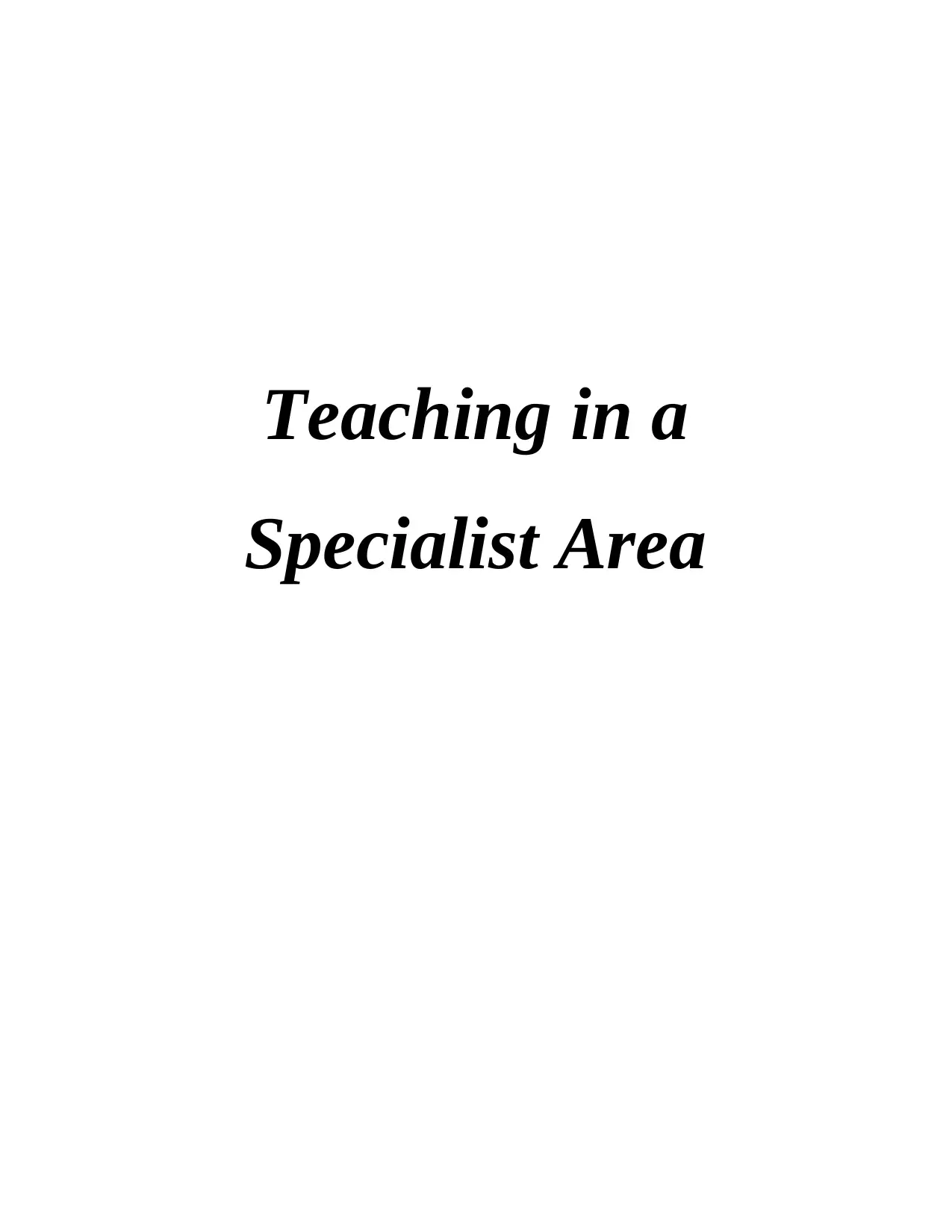
Teaching in a
Specialist Area
Specialist Area
Paraphrase This Document
Need a fresh take? Get an instant paraphrase of this document with our AI Paraphraser
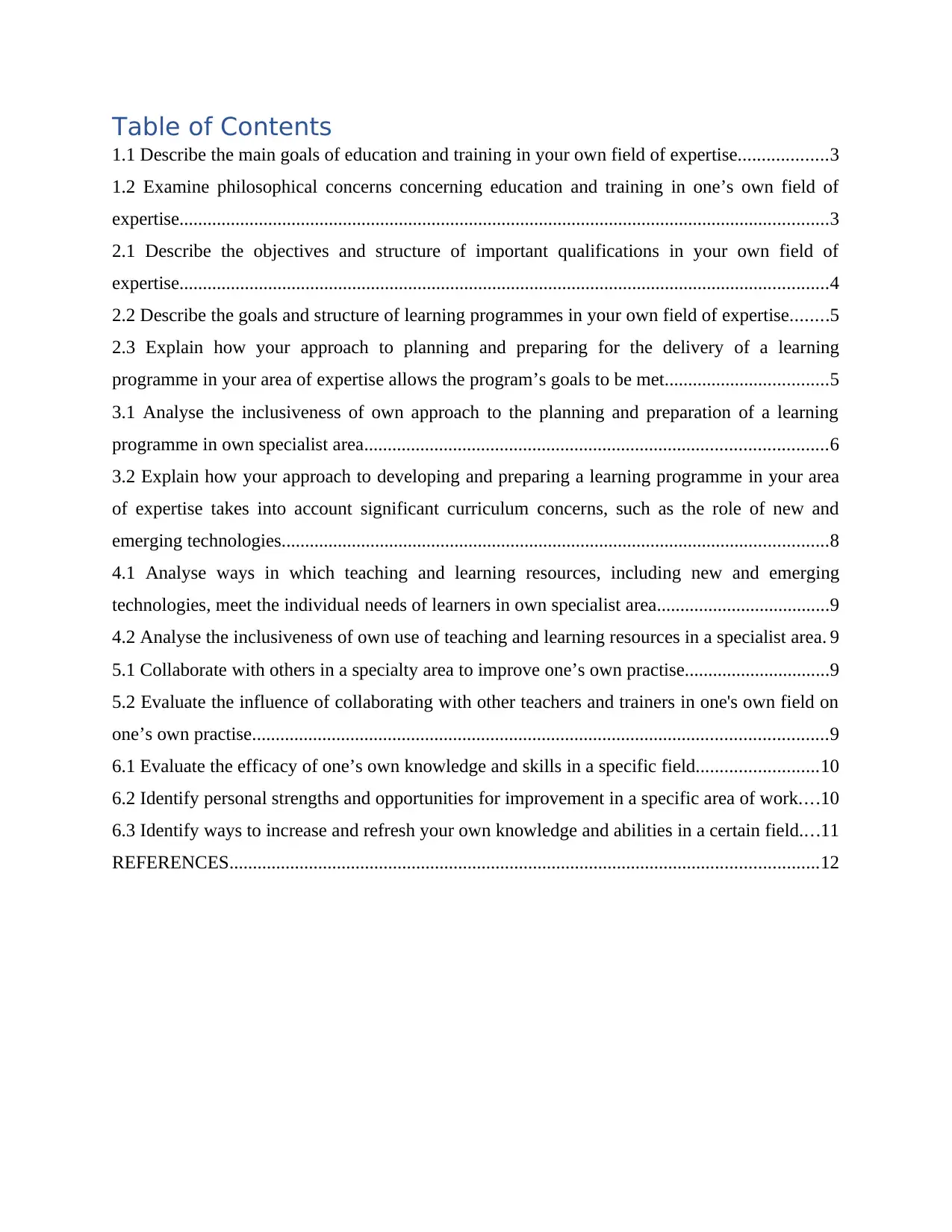
Table of Contents
1.1 Describe the main goals of education and training in your own field of expertise...................3
1.2 Examine philosophical concerns concerning education and training in one’s own field of
expertise...........................................................................................................................................3
2.1 Describe the objectives and structure of important qualifications in your own field of
expertise...........................................................................................................................................4
2.2 Describe the goals and structure of learning programmes in your own field of expertise........5
2.3 Explain how your approach to planning and preparing for the delivery of a learning
programme in your area of expertise allows the program’s goals to be met...................................5
3.1 Analyse the inclusiveness of own approach to the planning and preparation of a learning
programme in own specialist area...................................................................................................6
3.2 Explain how your approach to developing and preparing a learning programme in your area
of expertise takes into account significant curriculum concerns, such as the role of new and
emerging technologies.....................................................................................................................8
4.1 Analyse ways in which teaching and learning resources, including new and emerging
technologies, meet the individual needs of learners in own specialist area.....................................9
4.2 Analyse the inclusiveness of own use of teaching and learning resources in a specialist area. 9
5.1 Collaborate with others in a specialty area to improve one’s own practise...............................9
5.2 Evaluate the influence of collaborating with other teachers and trainers in one's own field on
one’s own practise...........................................................................................................................9
6.1 Evaluate the efficacy of one’s own knowledge and skills in a specific field..........................10
6.2 Identify personal strengths and opportunities for improvement in a specific area of work....10
6.3 Identify ways to increase and refresh your own knowledge and abilities in a certain field....11
REFERENCES..............................................................................................................................12
1.1 Describe the main goals of education and training in your own field of expertise...................3
1.2 Examine philosophical concerns concerning education and training in one’s own field of
expertise...........................................................................................................................................3
2.1 Describe the objectives and structure of important qualifications in your own field of
expertise...........................................................................................................................................4
2.2 Describe the goals and structure of learning programmes in your own field of expertise........5
2.3 Explain how your approach to planning and preparing for the delivery of a learning
programme in your area of expertise allows the program’s goals to be met...................................5
3.1 Analyse the inclusiveness of own approach to the planning and preparation of a learning
programme in own specialist area...................................................................................................6
3.2 Explain how your approach to developing and preparing a learning programme in your area
of expertise takes into account significant curriculum concerns, such as the role of new and
emerging technologies.....................................................................................................................8
4.1 Analyse ways in which teaching and learning resources, including new and emerging
technologies, meet the individual needs of learners in own specialist area.....................................9
4.2 Analyse the inclusiveness of own use of teaching and learning resources in a specialist area. 9
5.1 Collaborate with others in a specialty area to improve one’s own practise...............................9
5.2 Evaluate the influence of collaborating with other teachers and trainers in one's own field on
one’s own practise...........................................................................................................................9
6.1 Evaluate the efficacy of one’s own knowledge and skills in a specific field..........................10
6.2 Identify personal strengths and opportunities for improvement in a specific area of work....10
6.3 Identify ways to increase and refresh your own knowledge and abilities in a certain field....11
REFERENCES..............................................................................................................................12
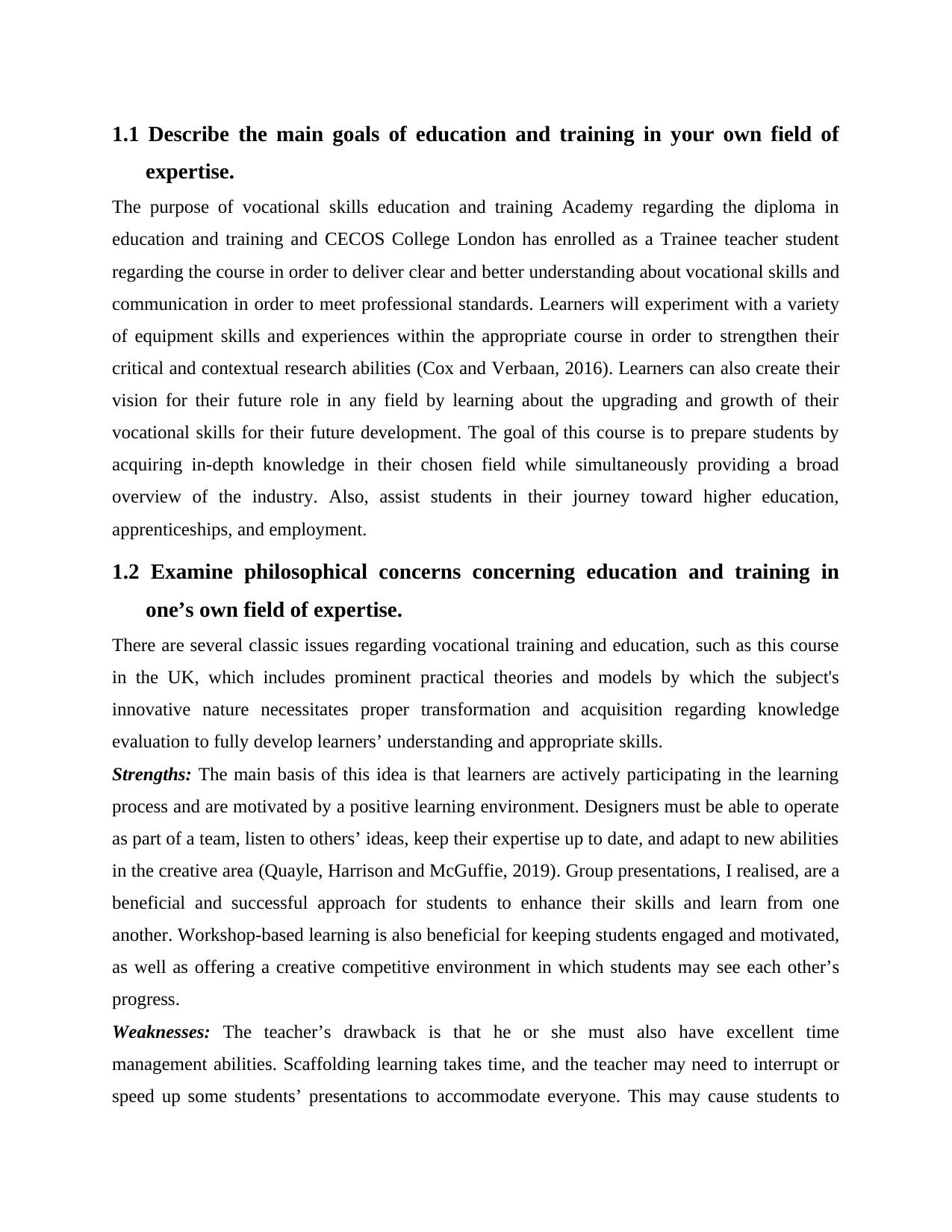
1.1 Describe the main goals of education and training in your own field of
expertise.
The purpose of vocational skills education and training Academy regarding the diploma in
education and training and CECOS College London has enrolled as a Trainee teacher student
regarding the course in order to deliver clear and better understanding about vocational skills and
communication in order to meet professional standards. Learners will experiment with a variety
of equipment skills and experiences within the appropriate course in order to strengthen their
critical and contextual research abilities (Cox and Verbaan, 2016). Learners can also create their
vision for their future role in any field by learning about the upgrading and growth of their
vocational skills for their future development. The goal of this course is to prepare students by
acquiring in-depth knowledge in their chosen field while simultaneously providing a broad
overview of the industry. Also, assist students in their journey toward higher education,
apprenticeships, and employment.
1.2 Examine philosophical concerns concerning education and training in
one’s own field of expertise.
There are several classic issues regarding vocational training and education, such as this course
in the UK, which includes prominent practical theories and models by which the subject's
innovative nature necessitates proper transformation and acquisition regarding knowledge
evaluation to fully develop learners’ understanding and appropriate skills.
Strengths: The main basis of this idea is that learners are actively participating in the learning
process and are motivated by a positive learning environment. Designers must be able to operate
as part of a team, listen to others’ ideas, keep their expertise up to date, and adapt to new abilities
in the creative area (Quayle, Harrison and McGuffie, 2019). Group presentations, I realised, are a
beneficial and successful approach for students to enhance their skills and learn from one
another. Workshop-based learning is also beneficial for keeping students engaged and motivated,
as well as offering a creative competitive environment in which students may see each other’s
progress.
Weaknesses: The teacher’s drawback is that he or she must also have excellent time
management abilities. Scaffolding learning takes time, and the teacher may need to interrupt or
speed up some students’ presentations to accommodate everyone. This may cause students to
expertise.
The purpose of vocational skills education and training Academy regarding the diploma in
education and training and CECOS College London has enrolled as a Trainee teacher student
regarding the course in order to deliver clear and better understanding about vocational skills and
communication in order to meet professional standards. Learners will experiment with a variety
of equipment skills and experiences within the appropriate course in order to strengthen their
critical and contextual research abilities (Cox and Verbaan, 2016). Learners can also create their
vision for their future role in any field by learning about the upgrading and growth of their
vocational skills for their future development. The goal of this course is to prepare students by
acquiring in-depth knowledge in their chosen field while simultaneously providing a broad
overview of the industry. Also, assist students in their journey toward higher education,
apprenticeships, and employment.
1.2 Examine philosophical concerns concerning education and training in
one’s own field of expertise.
There are several classic issues regarding vocational training and education, such as this course
in the UK, which includes prominent practical theories and models by which the subject's
innovative nature necessitates proper transformation and acquisition regarding knowledge
evaluation to fully develop learners’ understanding and appropriate skills.
Strengths: The main basis of this idea is that learners are actively participating in the learning
process and are motivated by a positive learning environment. Designers must be able to operate
as part of a team, listen to others’ ideas, keep their expertise up to date, and adapt to new abilities
in the creative area (Quayle, Harrison and McGuffie, 2019). Group presentations, I realised, are a
beneficial and successful approach for students to enhance their skills and learn from one
another. Workshop-based learning is also beneficial for keeping students engaged and motivated,
as well as offering a creative competitive environment in which students may see each other’s
progress.
Weaknesses: The teacher’s drawback is that he or she must also have excellent time
management abilities. Scaffolding learning takes time, and the teacher may need to interrupt or
speed up some students’ presentations to accommodate everyone. This may cause students to
⊘ This is a preview!⊘
Do you want full access?
Subscribe today to unlock all pages.

Trusted by 1+ million students worldwide
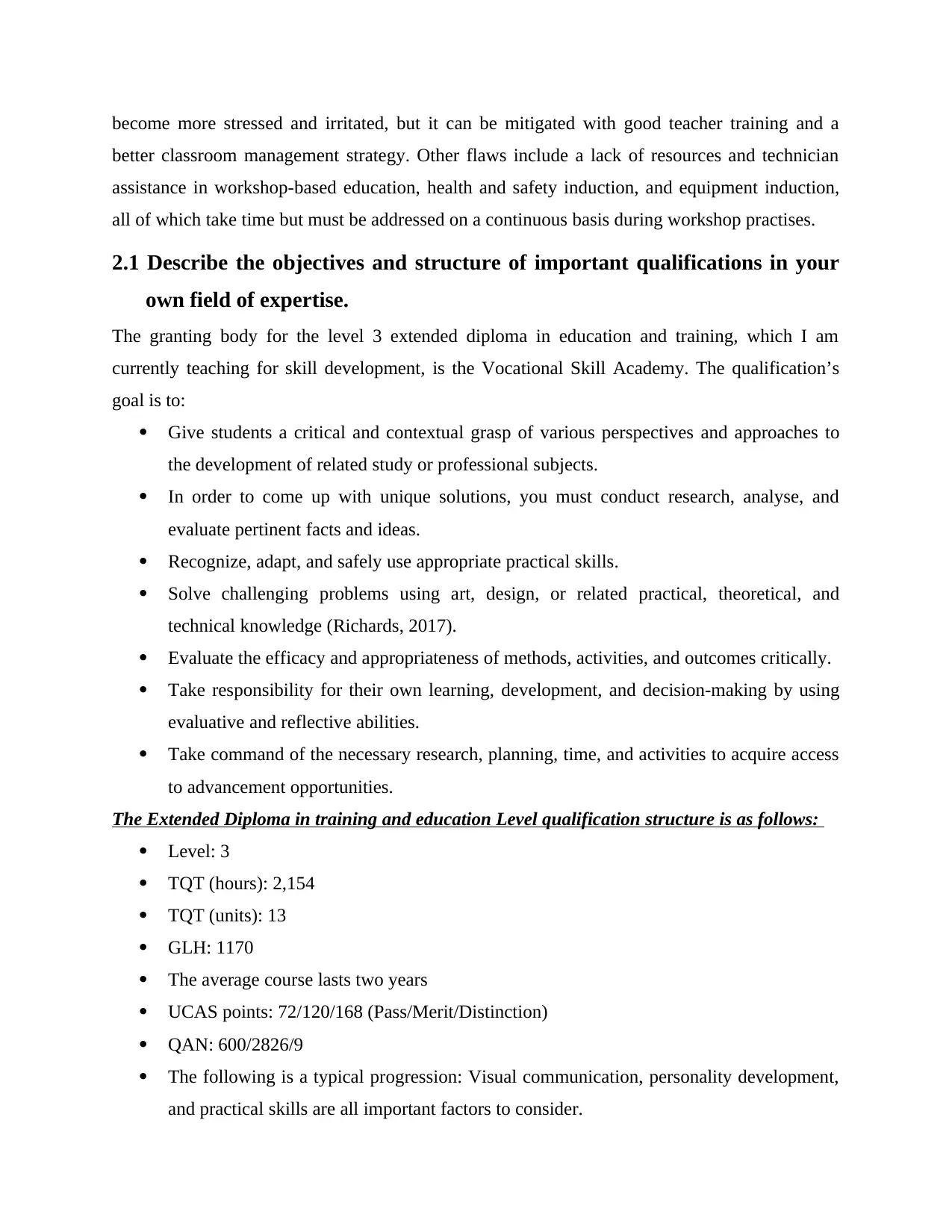
become more stressed and irritated, but it can be mitigated with good teacher training and a
better classroom management strategy. Other flaws include a lack of resources and technician
assistance in workshop-based education, health and safety induction, and equipment induction,
all of which take time but must be addressed on a continuous basis during workshop practises.
2.1 Describe the objectives and structure of important qualifications in your
own field of expertise.
The granting body for the level 3 extended diploma in education and training, which I am
currently teaching for skill development, is the Vocational Skill Academy. The qualification’s
goal is to:
Give students a critical and contextual grasp of various perspectives and approaches to
the development of related study or professional subjects.
In order to come up with unique solutions, you must conduct research, analyse, and
evaluate pertinent facts and ideas.
Recognize, adapt, and safely use appropriate practical skills.
Solve challenging problems using art, design, or related practical, theoretical, and
technical knowledge (Richards, 2017).
Evaluate the efficacy and appropriateness of methods, activities, and outcomes critically.
Take responsibility for their own learning, development, and decision-making by using
evaluative and reflective abilities.
Take command of the necessary research, planning, time, and activities to acquire access
to advancement opportunities.
The Extended Diploma in training and education Level qualification structure is as follows:
Level: 3
TQT (hours): 2,154
TQT (units): 13
GLH: 1170
The average course lasts two years
UCAS points: 72/120/168 (Pass/Merit/Distinction)
QAN: 600/2826/9
The following is a typical progression: Visual communication, personality development,
and practical skills are all important factors to consider.
better classroom management strategy. Other flaws include a lack of resources and technician
assistance in workshop-based education, health and safety induction, and equipment induction,
all of which take time but must be addressed on a continuous basis during workshop practises.
2.1 Describe the objectives and structure of important qualifications in your
own field of expertise.
The granting body for the level 3 extended diploma in education and training, which I am
currently teaching for skill development, is the Vocational Skill Academy. The qualification’s
goal is to:
Give students a critical and contextual grasp of various perspectives and approaches to
the development of related study or professional subjects.
In order to come up with unique solutions, you must conduct research, analyse, and
evaluate pertinent facts and ideas.
Recognize, adapt, and safely use appropriate practical skills.
Solve challenging problems using art, design, or related practical, theoretical, and
technical knowledge (Richards, 2017).
Evaluate the efficacy and appropriateness of methods, activities, and outcomes critically.
Take responsibility for their own learning, development, and decision-making by using
evaluative and reflective abilities.
Take command of the necessary research, planning, time, and activities to acquire access
to advancement opportunities.
The Extended Diploma in training and education Level qualification structure is as follows:
Level: 3
TQT (hours): 2,154
TQT (units): 13
GLH: 1170
The average course lasts two years
UCAS points: 72/120/168 (Pass/Merit/Distinction)
QAN: 600/2826/9
The following is a typical progression: Visual communication, personality development,
and practical skills are all important factors to consider.
Paraphrase This Document
Need a fresh take? Get an instant paraphrase of this document with our AI Paraphraser
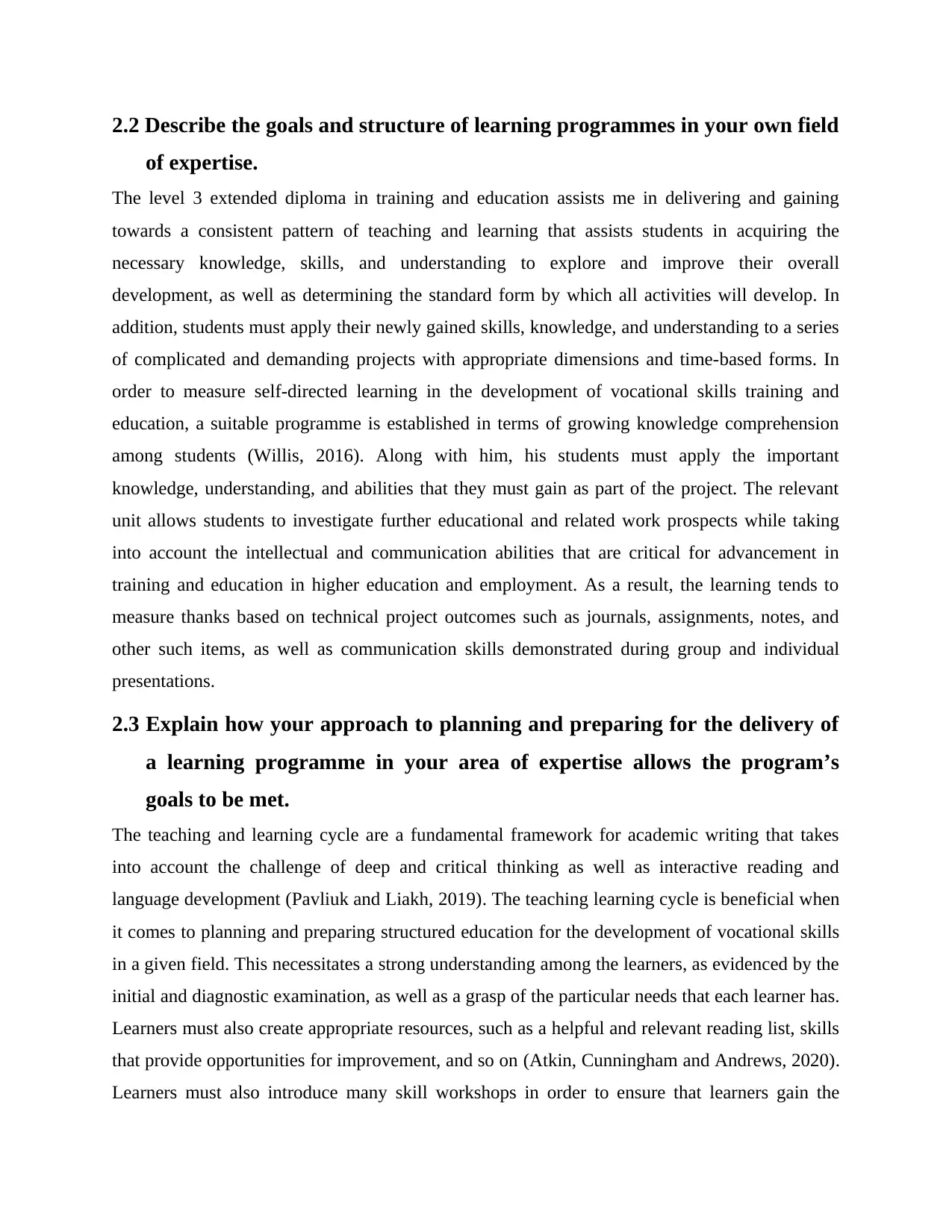
2.2 Describe the goals and structure of learning programmes in your own field
of expertise.
The level 3 extended diploma in training and education assists me in delivering and gaining
towards a consistent pattern of teaching and learning that assists students in acquiring the
necessary knowledge, skills, and understanding to explore and improve their overall
development, as well as determining the standard form by which all activities will develop. In
addition, students must apply their newly gained skills, knowledge, and understanding to a series
of complicated and demanding projects with appropriate dimensions and time-based forms. In
order to measure self-directed learning in the development of vocational skills training and
education, a suitable programme is established in terms of growing knowledge comprehension
among students (Willis, 2016). Along with him, his students must apply the important
knowledge, understanding, and abilities that they must gain as part of the project. The relevant
unit allows students to investigate further educational and related work prospects while taking
into account the intellectual and communication abilities that are critical for advancement in
training and education in higher education and employment. As a result, the learning tends to
measure thanks based on technical project outcomes such as journals, assignments, notes, and
other such items, as well as communication skills demonstrated during group and individual
presentations.
2.3 Explain how your approach to planning and preparing for the delivery of
a learning programme in your area of expertise allows the program’s
goals to be met.
The teaching and learning cycle are a fundamental framework for academic writing that takes
into account the challenge of deep and critical thinking as well as interactive reading and
language development (Pavliuk and Liakh, 2019). The teaching learning cycle is beneficial when
it comes to planning and preparing structured education for the development of vocational skills
in a given field. This necessitates a strong understanding among the learners, as evidenced by the
initial and diagnostic examination, as well as a grasp of the particular needs that each learner has.
Learners must also create appropriate resources, such as a helpful and relevant reading list, skills
that provide opportunities for improvement, and so on (Atkin, Cunningham and Andrews, 2020).
Learners must also introduce many skill workshops in order to ensure that learners gain the
of expertise.
The level 3 extended diploma in training and education assists me in delivering and gaining
towards a consistent pattern of teaching and learning that assists students in acquiring the
necessary knowledge, skills, and understanding to explore and improve their overall
development, as well as determining the standard form by which all activities will develop. In
addition, students must apply their newly gained skills, knowledge, and understanding to a series
of complicated and demanding projects with appropriate dimensions and time-based forms. In
order to measure self-directed learning in the development of vocational skills training and
education, a suitable programme is established in terms of growing knowledge comprehension
among students (Willis, 2016). Along with him, his students must apply the important
knowledge, understanding, and abilities that they must gain as part of the project. The relevant
unit allows students to investigate further educational and related work prospects while taking
into account the intellectual and communication abilities that are critical for advancement in
training and education in higher education and employment. As a result, the learning tends to
measure thanks based on technical project outcomes such as journals, assignments, notes, and
other such items, as well as communication skills demonstrated during group and individual
presentations.
2.3 Explain how your approach to planning and preparing for the delivery of
a learning programme in your area of expertise allows the program’s
goals to be met.
The teaching and learning cycle are a fundamental framework for academic writing that takes
into account the challenge of deep and critical thinking as well as interactive reading and
language development (Pavliuk and Liakh, 2019). The teaching learning cycle is beneficial when
it comes to planning and preparing structured education for the development of vocational skills
in a given field. This necessitates a strong understanding among the learners, as evidenced by the
initial and diagnostic examination, as well as a grasp of the particular needs that each learner has.
Learners must also create appropriate resources, such as a helpful and relevant reading list, skills
that provide opportunities for improvement, and so on (Atkin, Cunningham and Andrews, 2020).
Learners must also introduce many skill workshops in order to ensure that learners gain the
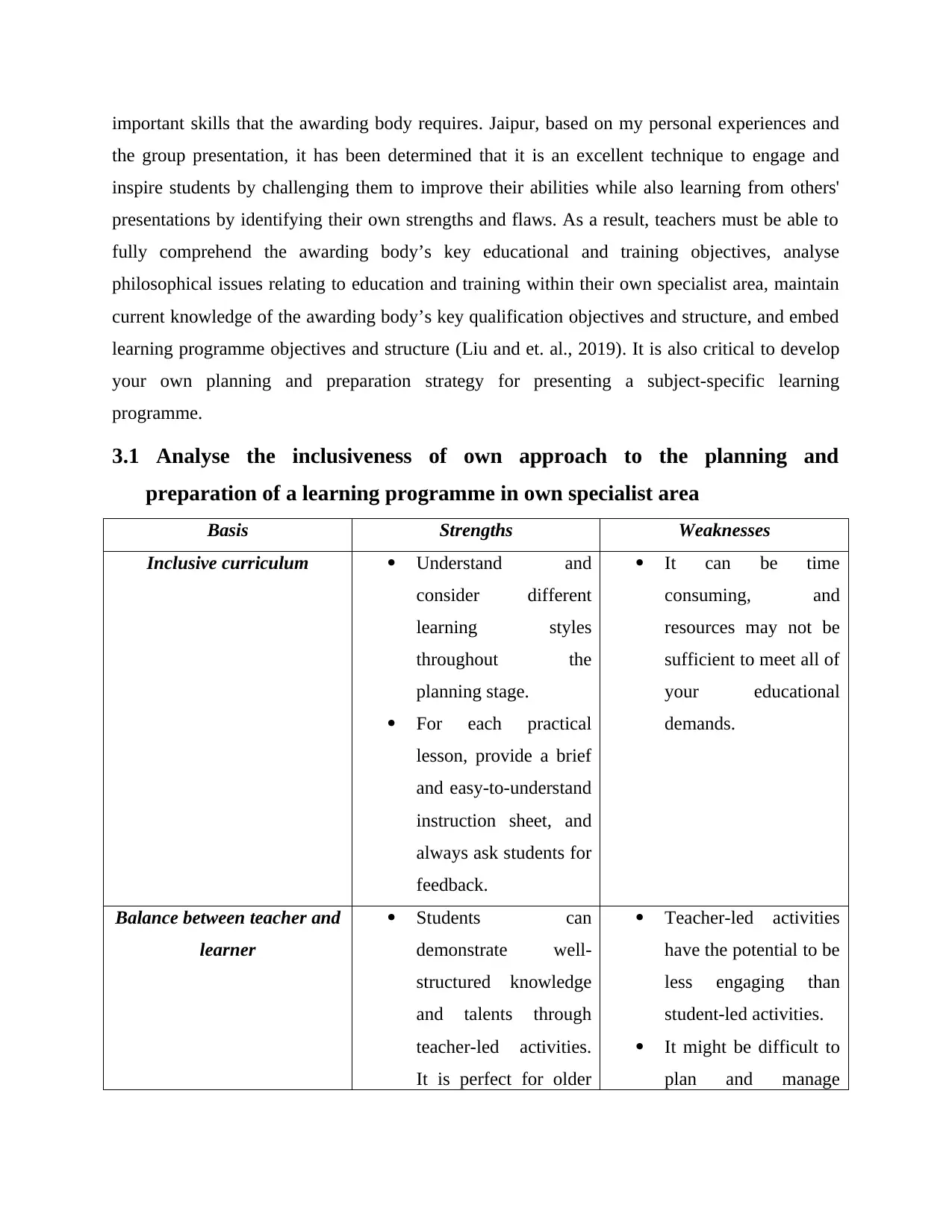
important skills that the awarding body requires. Jaipur, based on my personal experiences and
the group presentation, it has been determined that it is an excellent technique to engage and
inspire students by challenging them to improve their abilities while also learning from others'
presentations by identifying their own strengths and flaws. As a result, teachers must be able to
fully comprehend the awarding body’s key educational and training objectives, analyse
philosophical issues relating to education and training within their own specialist area, maintain
current knowledge of the awarding body’s key qualification objectives and structure, and embed
learning programme objectives and structure (Liu and et. al., 2019). It is also critical to develop
your own planning and preparation strategy for presenting a subject-specific learning
programme.
3.1 Analyse the inclusiveness of own approach to the planning and
preparation of a learning programme in own specialist area
Basis Strengths Weaknesses
Inclusive curriculum Understand and
consider different
learning styles
throughout the
planning stage.
For each practical
lesson, provide a brief
and easy-to-understand
instruction sheet, and
always ask students for
feedback.
It can be time
consuming, and
resources may not be
sufficient to meet all of
your educational
demands.
Balance between teacher and
learner
Students can
demonstrate well-
structured knowledge
and talents through
teacher-led activities.
It is perfect for older
Teacher-led activities
have the potential to be
less engaging than
student-led activities.
It might be difficult to
plan and manage
the group presentation, it has been determined that it is an excellent technique to engage and
inspire students by challenging them to improve their abilities while also learning from others'
presentations by identifying their own strengths and flaws. As a result, teachers must be able to
fully comprehend the awarding body’s key educational and training objectives, analyse
philosophical issues relating to education and training within their own specialist area, maintain
current knowledge of the awarding body’s key qualification objectives and structure, and embed
learning programme objectives and structure (Liu and et. al., 2019). It is also critical to develop
your own planning and preparation strategy for presenting a subject-specific learning
programme.
3.1 Analyse the inclusiveness of own approach to the planning and
preparation of a learning programme in own specialist area
Basis Strengths Weaknesses
Inclusive curriculum Understand and
consider different
learning styles
throughout the
planning stage.
For each practical
lesson, provide a brief
and easy-to-understand
instruction sheet, and
always ask students for
feedback.
It can be time
consuming, and
resources may not be
sufficient to meet all of
your educational
demands.
Balance between teacher and
learner
Students can
demonstrate well-
structured knowledge
and talents through
teacher-led activities.
It is perfect for older
Teacher-led activities
have the potential to be
less engaging than
student-led activities.
It might be difficult to
plan and manage
⊘ This is a preview!⊘
Do you want full access?
Subscribe today to unlock all pages.

Trusted by 1+ million students worldwide
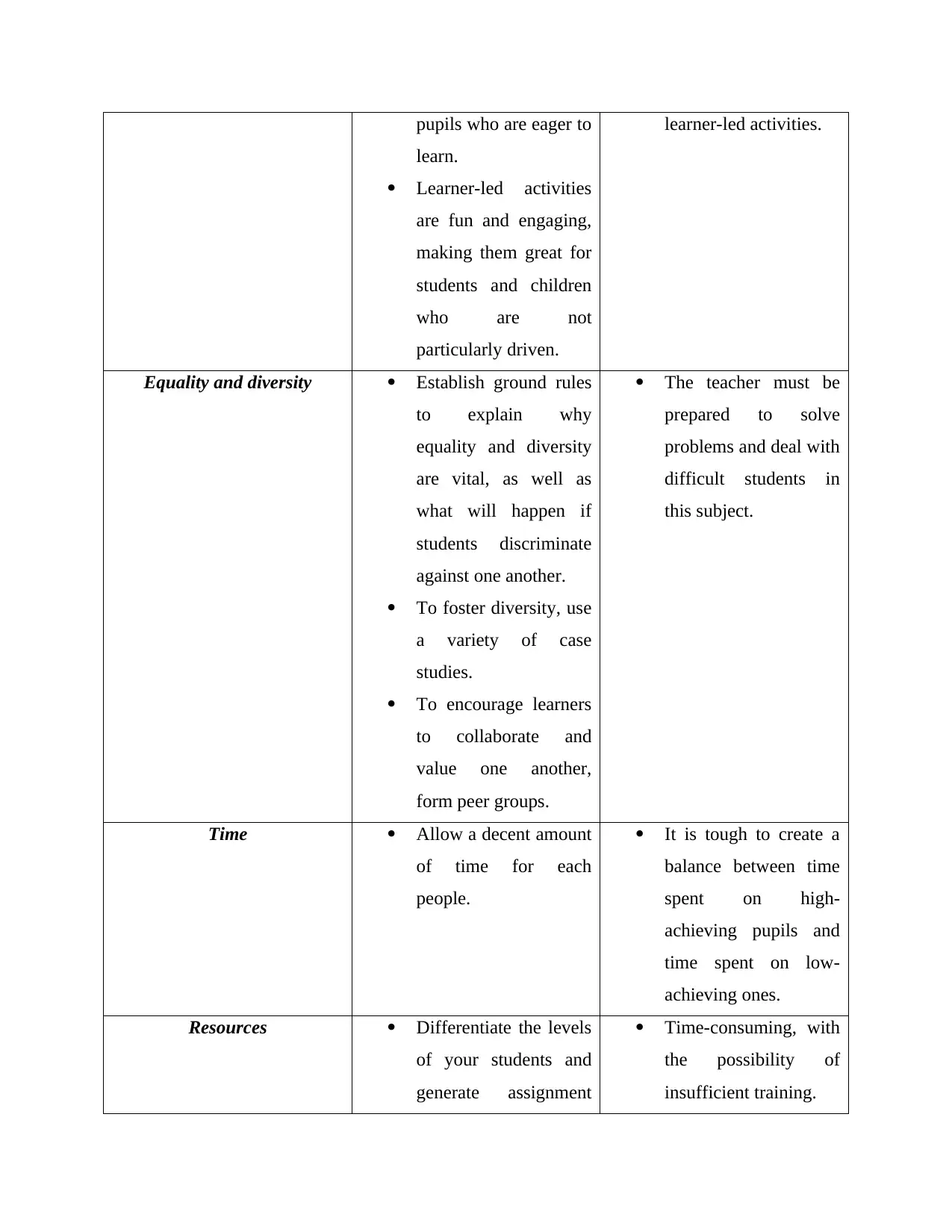
pupils who are eager to
learn.
Learner-led activities
are fun and engaging,
making them great for
students and children
who are not
particularly driven.
learner-led activities.
Equality and diversity Establish ground rules
to explain why
equality and diversity
are vital, as well as
what will happen if
students discriminate
against one another.
To foster diversity, use
a variety of case
studies.
To encourage learners
to collaborate and
value one another,
form peer groups.
The teacher must be
prepared to solve
problems and deal with
difficult students in
this subject.
Time Allow a decent amount
of time for each
people.
It is tough to create a
balance between time
spent on high-
achieving pupils and
time spent on low-
achieving ones.
Resources Differentiate the levels
of your students and
generate assignment
Time-consuming, with
the possibility of
insufficient training.
learn.
Learner-led activities
are fun and engaging,
making them great for
students and children
who are not
particularly driven.
learner-led activities.
Equality and diversity Establish ground rules
to explain why
equality and diversity
are vital, as well as
what will happen if
students discriminate
against one another.
To foster diversity, use
a variety of case
studies.
To encourage learners
to collaborate and
value one another,
form peer groups.
The teacher must be
prepared to solve
problems and deal with
difficult students in
this subject.
Time Allow a decent amount
of time for each
people.
It is tough to create a
balance between time
spent on high-
achieving pupils and
time spent on low-
achieving ones.
Resources Differentiate the levels
of your students and
generate assignment
Time-consuming, with
the possibility of
insufficient training.
Paraphrase This Document
Need a fresh take? Get an instant paraphrase of this document with our AI Paraphraser
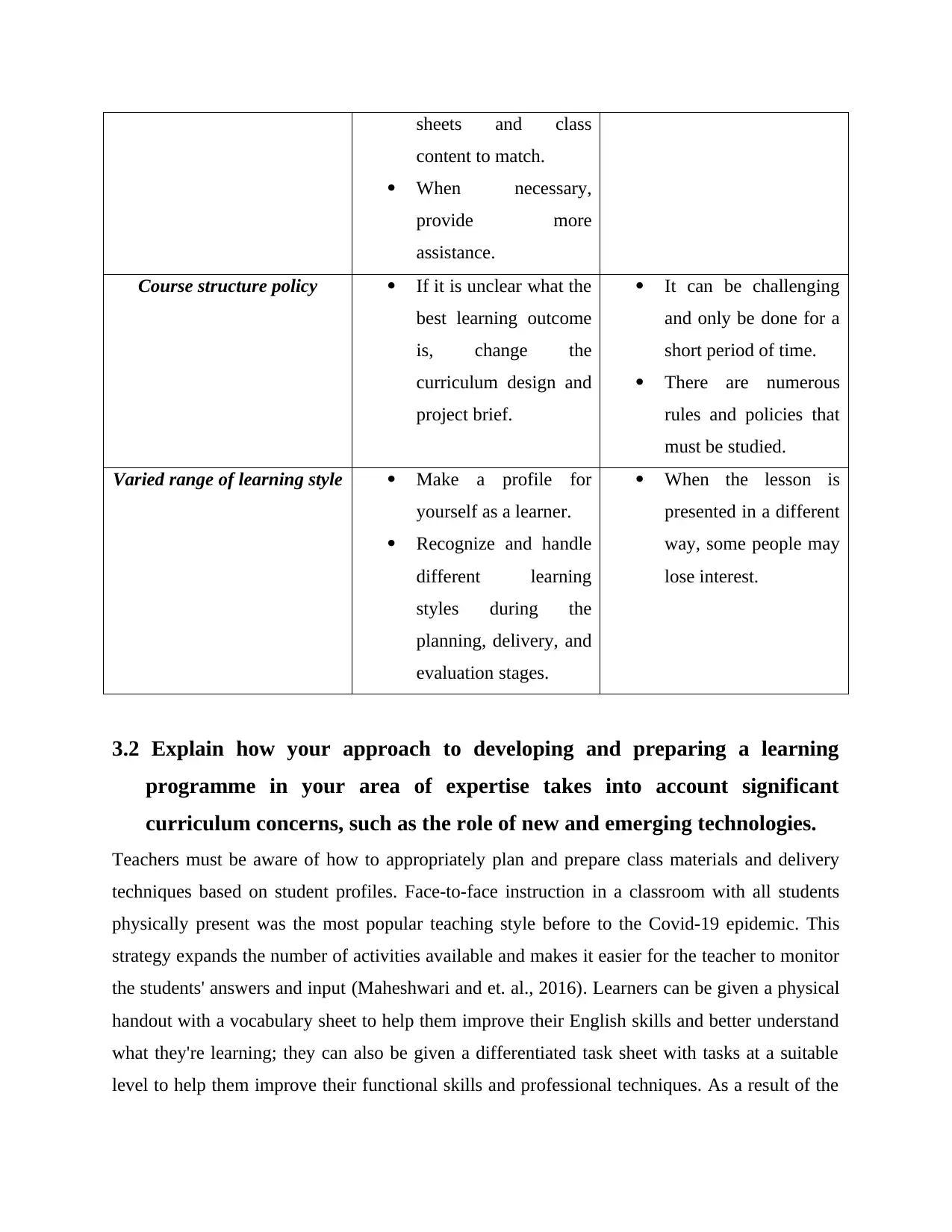
sheets and class
content to match.
When necessary,
provide more
assistance.
Course structure policy If it is unclear what the
best learning outcome
is, change the
curriculum design and
project brief.
It can be challenging
and only be done for a
short period of time.
There are numerous
rules and policies that
must be studied.
Varied range of learning style Make a profile for
yourself as a learner.
Recognize and handle
different learning
styles during the
planning, delivery, and
evaluation stages.
When the lesson is
presented in a different
way, some people may
lose interest.
3.2 Explain how your approach to developing and preparing a learning
programme in your area of expertise takes into account significant
curriculum concerns, such as the role of new and emerging technologies.
Teachers must be aware of how to appropriately plan and prepare class materials and delivery
techniques based on student profiles. Face-to-face instruction in a classroom with all students
physically present was the most popular teaching style before to the Covid-19 epidemic. This
strategy expands the number of activities available and makes it easier for the teacher to monitor
the students' answers and input (Maheshwari and et. al., 2016). Learners can be given a physical
handout with a vocabulary sheet to help them improve their English skills and better understand
what they're learning; they can also be given a differentiated task sheet with tasks at a suitable
level to help them improve their functional skills and professional techniques. As a result of the
content to match.
When necessary,
provide more
assistance.
Course structure policy If it is unclear what the
best learning outcome
is, change the
curriculum design and
project brief.
It can be challenging
and only be done for a
short period of time.
There are numerous
rules and policies that
must be studied.
Varied range of learning style Make a profile for
yourself as a learner.
Recognize and handle
different learning
styles during the
planning, delivery, and
evaluation stages.
When the lesson is
presented in a different
way, some people may
lose interest.
3.2 Explain how your approach to developing and preparing a learning
programme in your area of expertise takes into account significant
curriculum concerns, such as the role of new and emerging technologies.
Teachers must be aware of how to appropriately plan and prepare class materials and delivery
techniques based on student profiles. Face-to-face instruction in a classroom with all students
physically present was the most popular teaching style before to the Covid-19 epidemic. This
strategy expands the number of activities available and makes it easier for the teacher to monitor
the students' answers and input (Maheshwari and et. al., 2016). Learners can be given a physical
handout with a vocabulary sheet to help them improve their English skills and better understand
what they're learning; they can also be given a differentiated task sheet with tasks at a suitable
level to help them improve their functional skills and professional techniques. As a result of the
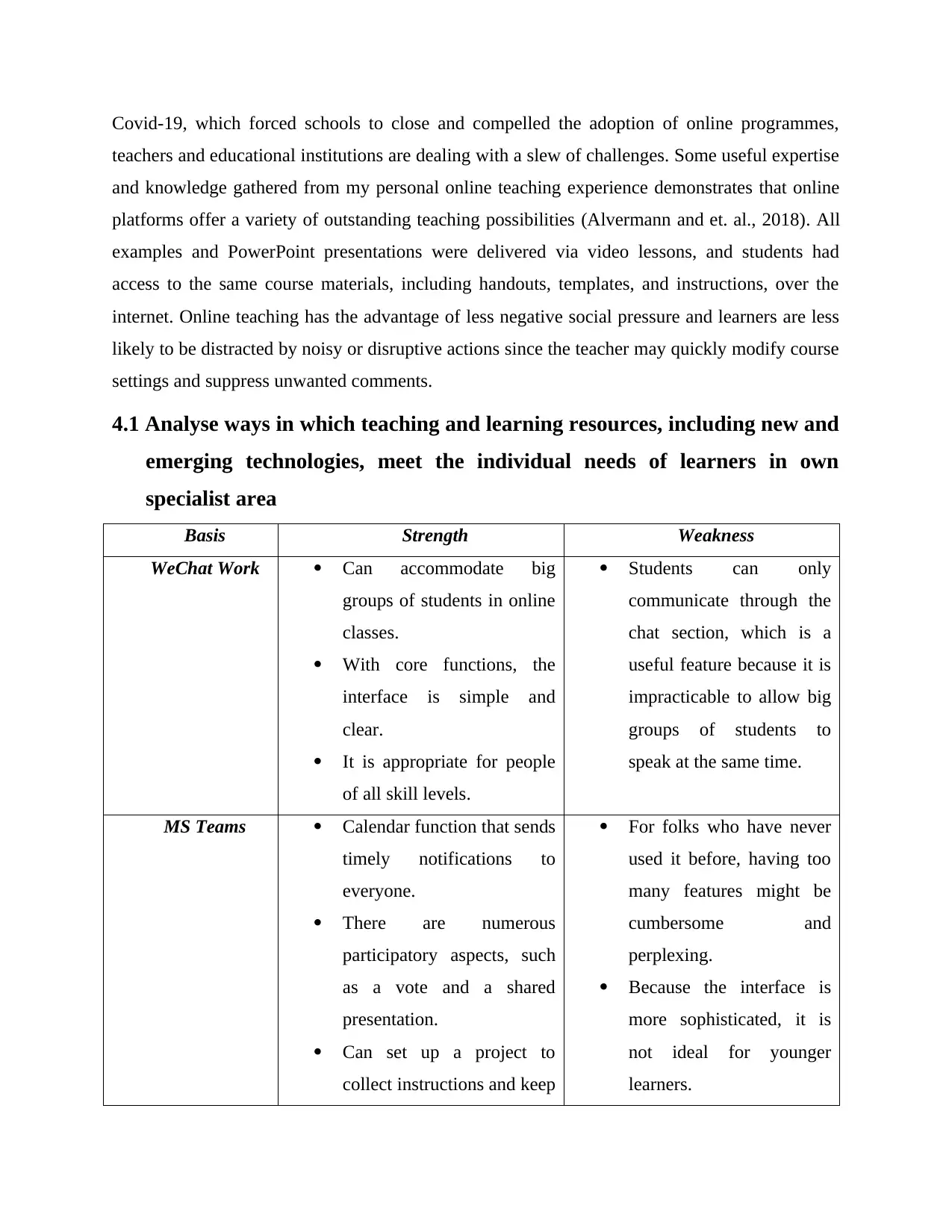
Covid-19, which forced schools to close and compelled the adoption of online programmes,
teachers and educational institutions are dealing with a slew of challenges. Some useful expertise
and knowledge gathered from my personal online teaching experience demonstrates that online
platforms offer a variety of outstanding teaching possibilities (Alvermann and et. al., 2018). All
examples and PowerPoint presentations were delivered via video lessons, and students had
access to the same course materials, including handouts, templates, and instructions, over the
internet. Online teaching has the advantage of less negative social pressure and learners are less
likely to be distracted by noisy or disruptive actions since the teacher may quickly modify course
settings and suppress unwanted comments.
4.1 Analyse ways in which teaching and learning resources, including new and
emerging technologies, meet the individual needs of learners in own
specialist area
Basis Strength Weakness
WeChat Work Can accommodate big
groups of students in online
classes.
With core functions, the
interface is simple and
clear.
It is appropriate for people
of all skill levels.
Students can only
communicate through the
chat section, which is a
useful feature because it is
impracticable to allow big
groups of students to
speak at the same time.
MS Teams Calendar function that sends
timely notifications to
everyone.
There are numerous
participatory aspects, such
as a vote and a shared
presentation.
Can set up a project to
collect instructions and keep
For folks who have never
used it before, having too
many features might be
cumbersome and
perplexing.
Because the interface is
more sophisticated, it is
not ideal for younger
learners.
teachers and educational institutions are dealing with a slew of challenges. Some useful expertise
and knowledge gathered from my personal online teaching experience demonstrates that online
platforms offer a variety of outstanding teaching possibilities (Alvermann and et. al., 2018). All
examples and PowerPoint presentations were delivered via video lessons, and students had
access to the same course materials, including handouts, templates, and instructions, over the
internet. Online teaching has the advantage of less negative social pressure and learners are less
likely to be distracted by noisy or disruptive actions since the teacher may quickly modify course
settings and suppress unwanted comments.
4.1 Analyse ways in which teaching and learning resources, including new and
emerging technologies, meet the individual needs of learners in own
specialist area
Basis Strength Weakness
WeChat Work Can accommodate big
groups of students in online
classes.
With core functions, the
interface is simple and
clear.
It is appropriate for people
of all skill levels.
Students can only
communicate through the
chat section, which is a
useful feature because it is
impracticable to allow big
groups of students to
speak at the same time.
MS Teams Calendar function that sends
timely notifications to
everyone.
There are numerous
participatory aspects, such
as a vote and a shared
presentation.
Can set up a project to
collect instructions and keep
For folks who have never
used it before, having too
many features might be
cumbersome and
perplexing.
Because the interface is
more sophisticated, it is
not ideal for younger
learners.
⊘ This is a preview!⊘
Do you want full access?
Subscribe today to unlock all pages.

Trusted by 1+ million students worldwide
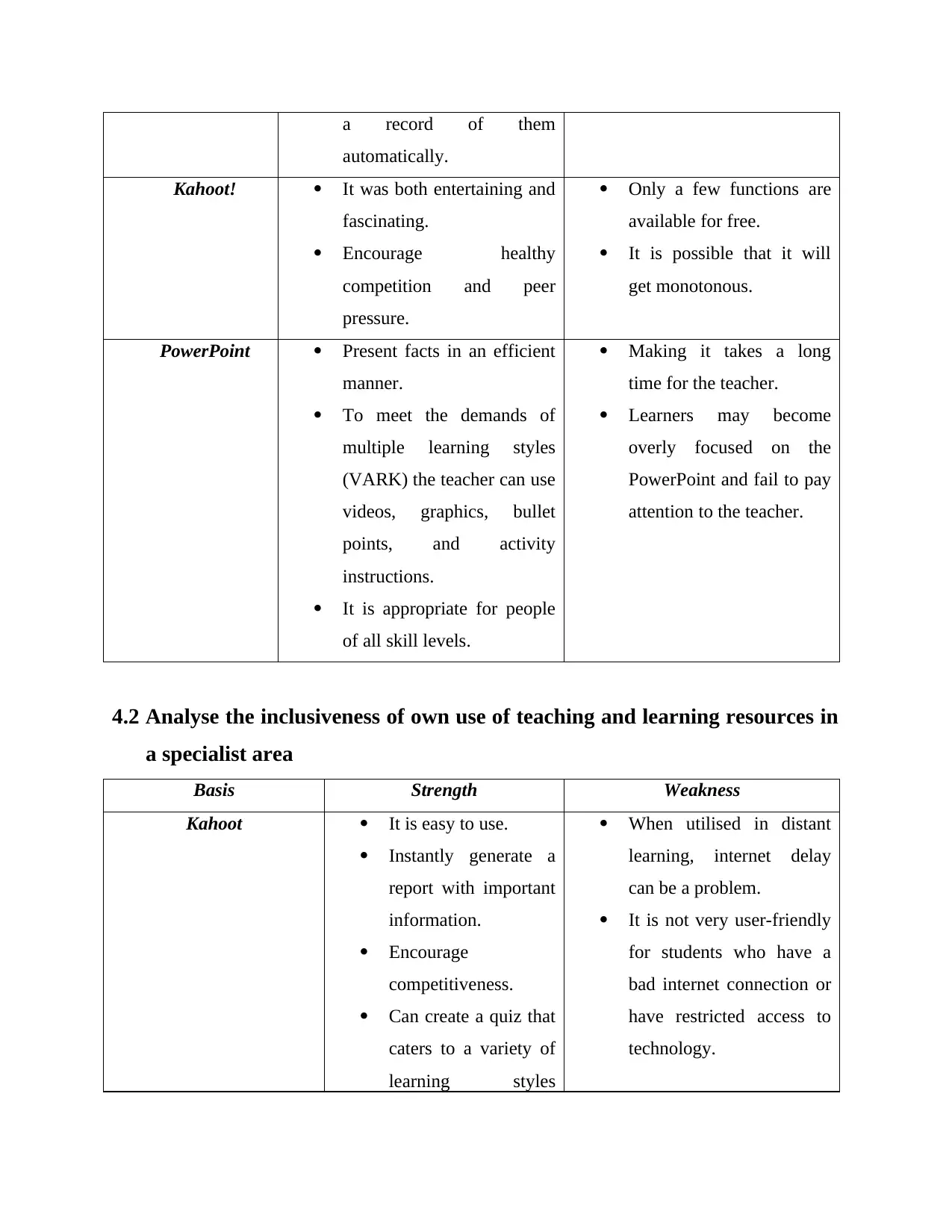
a record of them
automatically.
Kahoot! It was both entertaining and
fascinating.
Encourage healthy
competition and peer
pressure.
Only a few functions are
available for free.
It is possible that it will
get monotonous.
PowerPoint Present facts in an efficient
manner.
To meet the demands of
multiple learning styles
(VARK) the teacher can use
videos, graphics, bullet
points, and activity
instructions.
It is appropriate for people
of all skill levels.
Making it takes a long
time for the teacher.
Learners may become
overly focused on the
PowerPoint and fail to pay
attention to the teacher.
4.2 Analyse the inclusiveness of own use of teaching and learning resources in
a specialist area
Basis Strength Weakness
Kahoot It is easy to use.
Instantly generate a
report with important
information.
Encourage
competitiveness.
Can create a quiz that
caters to a variety of
learning styles
When utilised in distant
learning, internet delay
can be a problem.
It is not very user-friendly
for students who have a
bad internet connection or
have restricted access to
technology.
automatically.
Kahoot! It was both entertaining and
fascinating.
Encourage healthy
competition and peer
pressure.
Only a few functions are
available for free.
It is possible that it will
get monotonous.
PowerPoint Present facts in an efficient
manner.
To meet the demands of
multiple learning styles
(VARK) the teacher can use
videos, graphics, bullet
points, and activity
instructions.
It is appropriate for people
of all skill levels.
Making it takes a long
time for the teacher.
Learners may become
overly focused on the
PowerPoint and fail to pay
attention to the teacher.
4.2 Analyse the inclusiveness of own use of teaching and learning resources in
a specialist area
Basis Strength Weakness
Kahoot It is easy to use.
Instantly generate a
report with important
information.
Encourage
competitiveness.
Can create a quiz that
caters to a variety of
learning styles
When utilised in distant
learning, internet delay
can be a problem.
It is not very user-friendly
for students who have a
bad internet connection or
have restricted access to
technology.
Paraphrase This Document
Need a fresh take? Get an instant paraphrase of this document with our AI Paraphraser
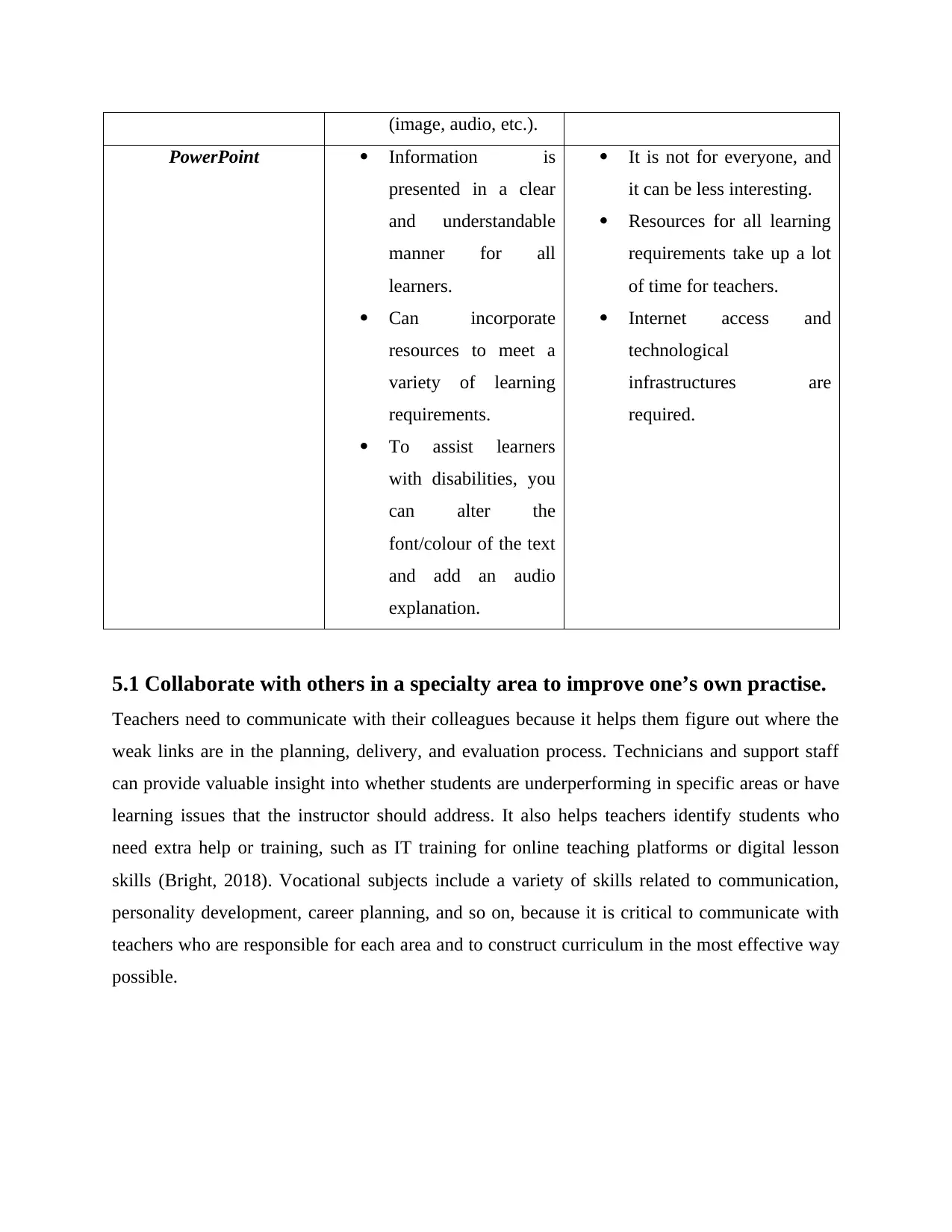
(image, audio, etc.).
PowerPoint Information is
presented in a clear
and understandable
manner for all
learners.
Can incorporate
resources to meet a
variety of learning
requirements.
To assist learners
with disabilities, you
can alter the
font/colour of the text
and add an audio
explanation.
It is not for everyone, and
it can be less interesting.
Resources for all learning
requirements take up a lot
of time for teachers.
Internet access and
technological
infrastructures are
required.
5.1 Collaborate with others in a specialty area to improve one’s own practise.
Teachers need to communicate with their colleagues because it helps them figure out where the
weak links are in the planning, delivery, and evaluation process. Technicians and support staff
can provide valuable insight into whether students are underperforming in specific areas or have
learning issues that the instructor should address. It also helps teachers identify students who
need extra help or training, such as IT training for online teaching platforms or digital lesson
skills (Bright, 2018). Vocational subjects include a variety of skills related to communication,
personality development, career planning, and so on, because it is critical to communicate with
teachers who are responsible for each area and to construct curriculum in the most effective way
possible.
PowerPoint Information is
presented in a clear
and understandable
manner for all
learners.
Can incorporate
resources to meet a
variety of learning
requirements.
To assist learners
with disabilities, you
can alter the
font/colour of the text
and add an audio
explanation.
It is not for everyone, and
it can be less interesting.
Resources for all learning
requirements take up a lot
of time for teachers.
Internet access and
technological
infrastructures are
required.
5.1 Collaborate with others in a specialty area to improve one’s own practise.
Teachers need to communicate with their colleagues because it helps them figure out where the
weak links are in the planning, delivery, and evaluation process. Technicians and support staff
can provide valuable insight into whether students are underperforming in specific areas or have
learning issues that the instructor should address. It also helps teachers identify students who
need extra help or training, such as IT training for online teaching platforms or digital lesson
skills (Bright, 2018). Vocational subjects include a variety of skills related to communication,
personality development, career planning, and so on, because it is critical to communicate with
teachers who are responsible for each area and to construct curriculum in the most effective way
possible.
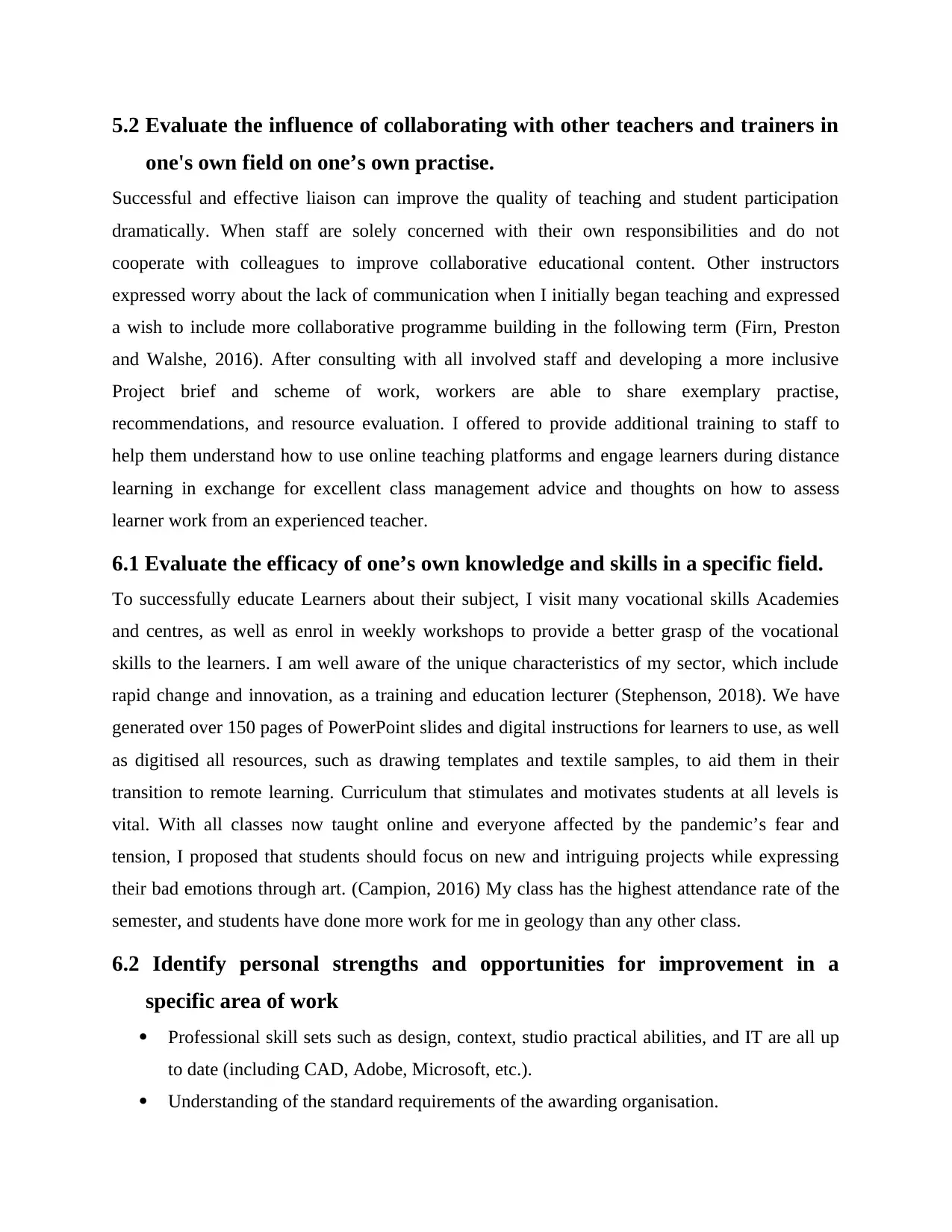
5.2 Evaluate the influence of collaborating with other teachers and trainers in
one's own field on one’s own practise.
Successful and effective liaison can improve the quality of teaching and student participation
dramatically. When staff are solely concerned with their own responsibilities and do not
cooperate with colleagues to improve collaborative educational content. Other instructors
expressed worry about the lack of communication when I initially began teaching and expressed
a wish to include more collaborative programme building in the following term (Firn, Preston
and Walshe, 2016). After consulting with all involved staff and developing a more inclusive
Project brief and scheme of work, workers are able to share exemplary practise,
recommendations, and resource evaluation. I offered to provide additional training to staff to
help them understand how to use online teaching platforms and engage learners during distance
learning in exchange for excellent class management advice and thoughts on how to assess
learner work from an experienced teacher.
6.1 Evaluate the efficacy of one’s own knowledge and skills in a specific field.
To successfully educate Learners about their subject, I visit many vocational skills Academies
and centres, as well as enrol in weekly workshops to provide a better grasp of the vocational
skills to the learners. I am well aware of the unique characteristics of my sector, which include
rapid change and innovation, as a training and education lecturer (Stephenson, 2018). We have
generated over 150 pages of PowerPoint slides and digital instructions for learners to use, as well
as digitised all resources, such as drawing templates and textile samples, to aid them in their
transition to remote learning. Curriculum that stimulates and motivates students at all levels is
vital. With all classes now taught online and everyone affected by the pandemic’s fear and
tension, I proposed that students should focus on new and intriguing projects while expressing
their bad emotions through art. (Campion, 2016) My class has the highest attendance rate of the
semester, and students have done more work for me in geology than any other class.
6.2 Identify personal strengths and opportunities for improvement in a
specific area of work
Professional skill sets such as design, context, studio practical abilities, and IT are all up
to date (including CAD, Adobe, Microsoft, etc.).
Understanding of the standard requirements of the awarding organisation.
one's own field on one’s own practise.
Successful and effective liaison can improve the quality of teaching and student participation
dramatically. When staff are solely concerned with their own responsibilities and do not
cooperate with colleagues to improve collaborative educational content. Other instructors
expressed worry about the lack of communication when I initially began teaching and expressed
a wish to include more collaborative programme building in the following term (Firn, Preston
and Walshe, 2016). After consulting with all involved staff and developing a more inclusive
Project brief and scheme of work, workers are able to share exemplary practise,
recommendations, and resource evaluation. I offered to provide additional training to staff to
help them understand how to use online teaching platforms and engage learners during distance
learning in exchange for excellent class management advice and thoughts on how to assess
learner work from an experienced teacher.
6.1 Evaluate the efficacy of one’s own knowledge and skills in a specific field.
To successfully educate Learners about their subject, I visit many vocational skills Academies
and centres, as well as enrol in weekly workshops to provide a better grasp of the vocational
skills to the learners. I am well aware of the unique characteristics of my sector, which include
rapid change and innovation, as a training and education lecturer (Stephenson, 2018). We have
generated over 150 pages of PowerPoint slides and digital instructions for learners to use, as well
as digitised all resources, such as drawing templates and textile samples, to aid them in their
transition to remote learning. Curriculum that stimulates and motivates students at all levels is
vital. With all classes now taught online and everyone affected by the pandemic’s fear and
tension, I proposed that students should focus on new and intriguing projects while expressing
their bad emotions through art. (Campion, 2016) My class has the highest attendance rate of the
semester, and students have done more work for me in geology than any other class.
6.2 Identify personal strengths and opportunities for improvement in a
specific area of work
Professional skill sets such as design, context, studio practical abilities, and IT are all up
to date (including CAD, Adobe, Microsoft, etc.).
Understanding of the standard requirements of the awarding organisation.
⊘ This is a preview!⊘
Do you want full access?
Subscribe today to unlock all pages.

Trusted by 1+ million students worldwide
1 out of 14
Related Documents
Your All-in-One AI-Powered Toolkit for Academic Success.
+13062052269
info@desklib.com
Available 24*7 on WhatsApp / Email
![[object Object]](/_next/static/media/star-bottom.7253800d.svg)
Unlock your academic potential
Copyright © 2020–2025 A2Z Services. All Rights Reserved. Developed and managed by ZUCOL.
